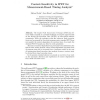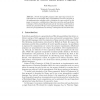597 search results - page 21 / 120 » Formal Techniques for Java-Like Programs |
125
Voted
JLP
2000
15 years 2 months ago
2000
In 1969 Cordell Green presented his seminal description of planning as theorem proving with the situation calculus. The most pleasing feature of Green's account was the negli...
190
click to vote
ISOLA
2010
Springer
15 years 5 days ago
2010
Springer
Abstract. The Implicit Path Enumeration Technique (IPET) has become widely accepted as a powerful technique to compute upper bounds on the Worst-Case Execution Time (WCET) of time-...
134
click to vote
FOIKS
2008
Springer
15 years 3 months ago
2008
Springer
Abstract. Argumentation-based formalisms provide a way of considering the defeasible nature of reasoning with partial and often erroneous knowledge in a given environment. This pro...
114
click to vote
FORTE
2008
15 years 3 months ago
2008
In software engineering, graphical formalisms, like state-transition tables and automata, are very often indispensable parts of the specifications. Such a formalism usually leads t...
109
click to vote
IPPS
2000
IEEE
15 years 6 months ago
2000
IEEE
Abstract. Nested data-parallel programs often have large memory requirements due to their high degree of parallelism. Piecewise execution is an implementation technique used to min...



